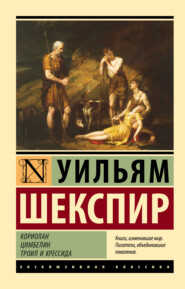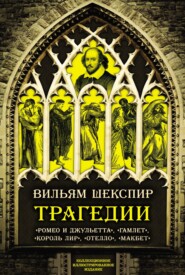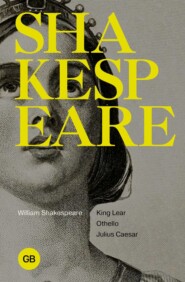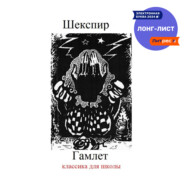По всем вопросам обращайтесь на: info@litportal.ru
(©) 2003-2025.
✖
King Henry the Eighth
Настройки чтения
Размер шрифта
Высота строк
Поля
And princely care, foreseeing those fell mischiefs
Our reasons laid before him-hath commanded
To-morrow morning to the Council board
He be convented. He's a rank weed, Sir Thomas,
And we must root him out. From your affairs
I hinder you too long-good night, Sir Thomas.
LOVELL. Many good nights, my lord; I rest your servant.
Exeunt GARDINER and
PAGE
Enter the KING and the DUKE OF SUFFOLK
KING. Charles, I will play no more to-night;
My mind's not on't; you are too hard for me.
SUFFOLK. Sir, I did never win of you before.
KING. But little, Charles;
Nor shall not, when my fancy's on my play.
Now, Lovell, from the Queen what is the news?
LOVELL. I could not personally deliver to her
What you commanded me, but by her woman
I sent your message; who return'd her thanks
In the great'st humbleness, and desir'd your Highness
Most heartily to pray for her.
KING. What say'st thou, ha?
To pray for her? What, is she crying out?
LOVELL. So said her woman; and that her suff'rance made
Almost each pang a death.
KING. Alas, good lady!
SUFFOLK. God safely quit her of her burden, and
With gentle travail, to the gladding of
Your Highness with an heir!
KING. 'Tis midnight, Charles;
Prithee to bed; and in thy pray'rs remember
Th' estate of my poor queen. Leave me alone,
For I must think of that which company
Will not be friendly to.
SUFFOLK. I wish your Highness
A quiet night, and my good mistress will
Remember in my prayers.
KING. Charles, good night. Exit
SUFFOLK
Enter SIR ANTHONY DENNY
Well, sir, what follows?
DENNY. Sir, I have brought my lord the Archbishop,
As you commanded me.
KING. Ha! Canterbury?
DENNY. Ay, my good lord.
KING. 'Tis true. Where is he, Denny?
DENNY. He attends your Highness' pleasure.
KING. Bring him to us. Exit
DENNY
LOVELL. [Aside] This is about that which the bishop spake.
I am happily come hither.
Re-enter DENNY, With CRANMER
KING. Avoid the gallery. [LOVELL seems to
stay]
Ha! I have said. Be gone.
What! Exeunt LOVELL and
DENNY
CRANMER. [Aside] I am fearful-wherefore frowns he thus?
'Tis his aspect of terror. All's not well.
KING. How now, my lord? You do desire to know
Wherefore I sent for you.
CRANMER. [Kneeling] It is my duty
T'attend your Highness' pleasure.
KING. Pray you, arise,
My good and gracious Lord of Canterbury.
Come, you and I must walk a turn together;
I have news to tell you; come, come, me your hand.
Ah, my good lord, I grieve at what I speak,
And am right sorry to repeat what follows.
I have, and most unwillingly, of late
Heard many grievous-I do say, my lord,
Grievous-complaints of you; which, being consider'd,
Have mov'd us and our Council that you shall
This morning come before us; where I know
You cannot with such freedom purge yourself
But that, till further trial in those charges
Which will require your answer, you must take
Your patience to you and be well contented
To make your house our Tow'r. You a brother of us,
It fits we thus proceed, or else no witness
Would come against you.
CRANMER. I humbly thank your Highness
And am right glad to catch this good occasion
Most throughly to be winnowed where my chaff
And corn shall fly asunder; for I know
There's none stands under more calumnious tongues
Than I myself, poor man.
KING. Stand up, good Canterbury;
Thy truth and thy integrity is rooted
In us, thy friend. Give me thy hand, stand up;
Prithee let's walk. Now, by my holidame,
What manner of man are you? My lord, I look'd
You would have given me your petition that
I should have ta'en some pains to bring together
Our reasons laid before him-hath commanded
To-morrow morning to the Council board
He be convented. He's a rank weed, Sir Thomas,
And we must root him out. From your affairs
I hinder you too long-good night, Sir Thomas.
LOVELL. Many good nights, my lord; I rest your servant.
Exeunt GARDINER and
PAGE
Enter the KING and the DUKE OF SUFFOLK
KING. Charles, I will play no more to-night;
My mind's not on't; you are too hard for me.
SUFFOLK. Sir, I did never win of you before.
KING. But little, Charles;
Nor shall not, when my fancy's on my play.
Now, Lovell, from the Queen what is the news?
LOVELL. I could not personally deliver to her
What you commanded me, but by her woman
I sent your message; who return'd her thanks
In the great'st humbleness, and desir'd your Highness
Most heartily to pray for her.
KING. What say'st thou, ha?
To pray for her? What, is she crying out?
LOVELL. So said her woman; and that her suff'rance made
Almost each pang a death.
KING. Alas, good lady!
SUFFOLK. God safely quit her of her burden, and
With gentle travail, to the gladding of
Your Highness with an heir!
KING. 'Tis midnight, Charles;
Prithee to bed; and in thy pray'rs remember
Th' estate of my poor queen. Leave me alone,
For I must think of that which company
Will not be friendly to.
SUFFOLK. I wish your Highness
A quiet night, and my good mistress will
Remember in my prayers.
KING. Charles, good night. Exit
SUFFOLK
Enter SIR ANTHONY DENNY
Well, sir, what follows?
DENNY. Sir, I have brought my lord the Archbishop,
As you commanded me.
KING. Ha! Canterbury?
DENNY. Ay, my good lord.
KING. 'Tis true. Where is he, Denny?
DENNY. He attends your Highness' pleasure.
KING. Bring him to us. Exit
DENNY
LOVELL. [Aside] This is about that which the bishop spake.
I am happily come hither.
Re-enter DENNY, With CRANMER
KING. Avoid the gallery. [LOVELL seems to
stay]
Ha! I have said. Be gone.
What! Exeunt LOVELL and
DENNY
CRANMER. [Aside] I am fearful-wherefore frowns he thus?
'Tis his aspect of terror. All's not well.
KING. How now, my lord? You do desire to know
Wherefore I sent for you.
CRANMER. [Kneeling] It is my duty
T'attend your Highness' pleasure.
KING. Pray you, arise,
My good and gracious Lord of Canterbury.
Come, you and I must walk a turn together;
I have news to tell you; come, come, me your hand.
Ah, my good lord, I grieve at what I speak,
And am right sorry to repeat what follows.
I have, and most unwillingly, of late
Heard many grievous-I do say, my lord,
Grievous-complaints of you; which, being consider'd,
Have mov'd us and our Council that you shall
This morning come before us; where I know
You cannot with such freedom purge yourself
But that, till further trial in those charges
Which will require your answer, you must take
Your patience to you and be well contented
To make your house our Tow'r. You a brother of us,
It fits we thus proceed, or else no witness
Would come against you.
CRANMER. I humbly thank your Highness
And am right glad to catch this good occasion
Most throughly to be winnowed where my chaff
And corn shall fly asunder; for I know
There's none stands under more calumnious tongues
Than I myself, poor man.
KING. Stand up, good Canterbury;
Thy truth and thy integrity is rooted
In us, thy friend. Give me thy hand, stand up;
Prithee let's walk. Now, by my holidame,
What manner of man are you? My lord, I look'd
You would have given me your petition that
I should have ta'en some pains to bring together

















